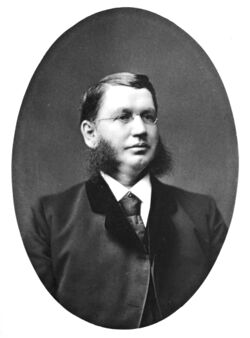Hosea W. Libbey
From Kook Science
| Hosea W. Libbey | |
|---|---|
 Photo portrait from The Libby Family in America, 1602-1881 (B. Thurston & Co: Portland, ME, 1882). | |
| Born | Hosea Wait Libby [i] 28 June 1834 Chichester, New Hampshire (or Lebanon, Maine) |
| Died | 18 August 1900 (66) Boston, Suffolk, Massachusetts |
| Burial | Mount Auburn Cemetery, Cambridge, Mass. |
Hosea Wait(e) Libbey (June 28, 1834 - August 18, 1900) was an American patent medicine manufacturer and sanitaria operator, his "Hygienetariums" in Cleveland, Ohio and Boston, Massachusetts offering "medicated vapor baths" and treatment using "Indian herbal remedies," including cancer-cure plasters and assorted other restoratives and blood purifying panaceas. Though he referred to himself as a doctor, Libbey was never licensed by any medical authority, indeed being actively denied credentials in Ohio, and was not known to have graduated from any medical school.
In his later years, Libbey spent a great deal of his time designing and patenting various novel forms of transportation, including various automobile designs, an "automatic aerial railroad" system (also called a perpetual motion railroad in press reports), a "foot cycle" personal transportation vehicle, a steam-powered bicycle, and an electrical bicycle.
Libbey's Hygienetariums
- Dr. H. W. Libbey's Indian Medical Infirmary and National Bath Rooms at Nos. 90 & 92 Seneca Street, Cleveland, Ohio; see pamphlet: https://wellcomecollection.org/works/fjdudtdu
- No. 55 Rutland Square, Boston, Massachusetts
Press Coverage
Unusual Patents
- "DR. LIBBEY'S PERPETUAL MOTION RAILROAD.", Boston Globe (Boston, MA): 4, 3 Mar. 1893, https://www.newspapers.com/newspage/430699035
- "CAR THAT SWEEPS THE STREETS", Philadelphia Inquirer (Philadelphia, PA): 26, 14 Feb. 1897, https://www.newspapers.com/newspage/168099873
- "BICYCLES ON YOUR FEET. Dr. Libbey of Boston Has Invented a Means of Locomotion That Will Make Travel a Pastime, He Says.", Boston Globe (Boston, MA): 9, 23 Aug. 1897, https://www.newspapers.com/newspage/430851245
Notes
- ↑ Libbey appears to have added the "e" to his surname in his adult years, likewise adding an "e" to his middle name, becoming "Hosea Waite Libby"; as seen in Bacon, Edwin M., ed. (1896), "LIBBEY, Hosea Waite", Men of Progress: One Thousand Biographical Sketches and Portraits, Boston: New England Magazine, p. 583-584, https://babel.hathitrust.org/cgi/pt?id=nyp.33433003360090&view=1up&seq=581&q1=%22Hosea%20W.%20Libbey%22